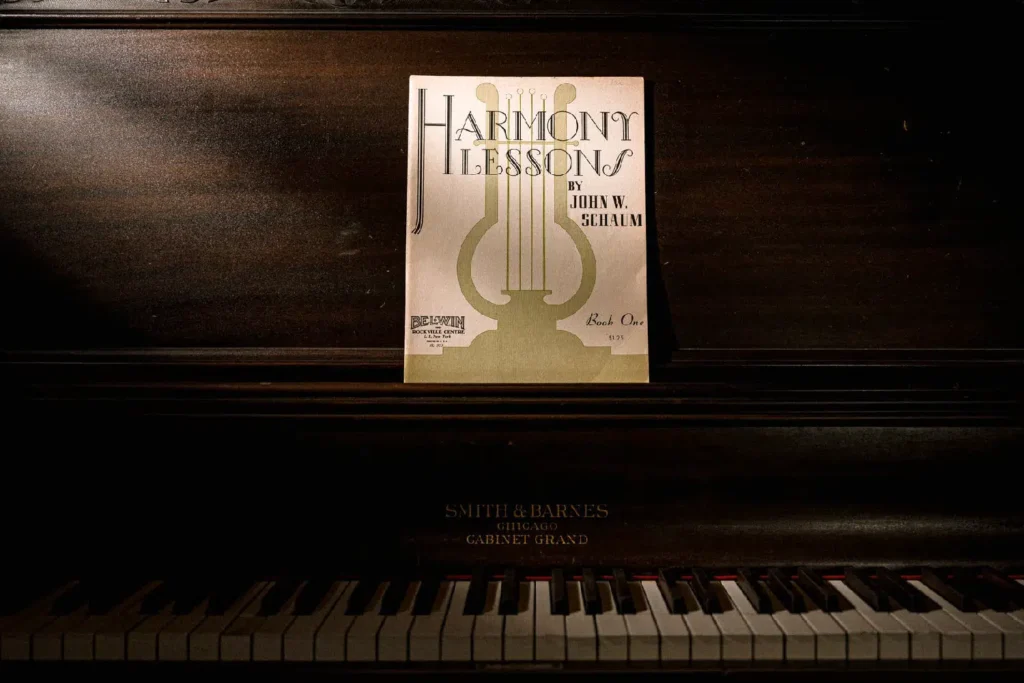Online Piano Lessons
Piano lessons with a qualified and experienced instructor can make all the difference in learning to play the piano, whether you are just starting out, or to master what you already know.
Whatever your goals are, we are here to help you achieve it in the most comfortable environment we can provide for you.


Adrian Soliz

Alexandra Exeter

Alexis Korbe

Brandon Tuzio

Bryn Colodny

Christian Scott

Denise Brown

Ivy Phairchyld

Melodi Alper

Nic Brannen

Adrian Soliz
Elite Vocal Instructor
Degree: Bachelor of Arts in Music
Pronouns: He/Him
Skill Levels: Beginner, Intermediate, Advanced
Subjects Taught: Feminine Voice, Masculine Voice, Androgynous Voice
Music Classes: Singing, Piano, Metal Screaming
Adrian Soliz is a graduate from UTSA (Bachelor of Arts in Music) who has been teaching in the San Antonio area since 2016. He has taught all levels of singers, from 6 years old to adults, many different genres of music, and transgender voice training. He is an advocate for using science to better understand how the voice works to allow his students to have much more vocal freedom/expression, and to achieve a voice they are most comfortable with.
His biggest project right now is being the president of the Young Professional Opera Guild, where he seeks to be an advocate for community members and performers. This nonprofit works bring opera education to the community through various popup performances, recitals and opera education watch parties. “My goal as a voice teacher is to create an environment where my students feel safe and secure enough that they can allow themselves to unleash the artist that is in everyone. In just the past few years the field of voice science has grown exponentially in its use to help people understand how the human voice functions.
I want to use this knowledge that we use to help singers become much more aware and confident in their singing voices, and transfer it to helping the trans community find their own true voice. As a fellow member of the LGBTQ community I understand what is was like to not feel comfortable in my own skin before i came out, so I would like to help any individual going through this same process in any way that i can.”
Skills

Alexandra Exeter
Lead Director and CEO
Degree: Bachelor’s Degree
Pronouns: She/Her
Skill Levels: Beginner, Intermediate, Advanced
Subjects Taught: Feminine Voice, Masculine Voice, Androgynous Voice
Music Classes: Singing, Piano, Music Theory
Alexandra Exeter is a 3rd generation protégé of Claude Debussy, she is a master of the French Classical piano technique. She boasts 13+ years of experience as a music educator with numerous contest winning students. Alexandra has directed numerous musicals, and has a Bachelor’s in Piano Performance from Southern Illinois University Edwardsville.
Alexandra is the CEO and Lead Director of Your Lessons Now. She trains other instructors in addition to having students of her own. Alexandra has been a transgender voice coach for several years now and developed a great deal of material to contribute to the company’s curriculum. She has served as a vocal coach and director for productions of Sweeney Todd, Addams Family, Amahl and the Night Visitors, and Into the Woods. She’s held performances of the 24 Italian Songs and Arias and other pieces of operatic repertoire.
Alexandra has extensive experience in French and Italian vocal repertoire, and she has training in a variety of genres including jazz/rock/pop/metal. Alexandra has experience in bands and local groups, and has served an instrumental role in several music programs and institutions in both St. Louis Missouri and Denver Colorado. She owned and operated Exeter Music in St. Louis. Alexandra taught for and served as the music director for the Metro East Montessori School, served as an music instructor for Flagstaff Academy in Longmont Colorado, as well as several other private institutions including Schmitt Music in O’Fallon, Illinois.
Whatever your voice goals, Alexandra can help.
Skills

Alexis Korbe
Vocal Instructor
Degree: Master of Music in Flute Performance, Master of Music in Opera
Pronouns: She/Her
Skill Levels: Beginner, Intermediate, Advanced
Subjects Taught: Feminine Voice, Masculine Voice, Androgynous Voice
Music Classes: Singing, Flute, Piano Alexis Korbe is a Lyric Mezzo Soprano, Flutist, and Collaborative Pianist.
Originally from Hays, Kansas, she holds a Bachelor of Music in Flute Performance. Secondly, a Bachelor of Arts in French from Fort Hays State University. There, she won the Lyle Dilley Outstanding Band Musician Award. In Wichita, she received a Koch Cultural Trust Grant, the Frances Shelly Fellowship, and the Michael P. Tilford Fellowship. She had a Graduate Administrative Assistantship as well as a Graduate Staff Assistantship while attending Wichita State University.
Alexis finished a Master of Music in Flute Performance with Dr. Frances Shelly in 2014. Moreover, she earned a Master of Music in Opera Performance with Dr. Pina Mozzani in 2016. She accompanied for WSU’s choirs and was a Concerto/Aria Competition Finalist. She played keyboard and flute for numerous shows with several companies.
In 2018, she earned an Artist Diploma in Voice at the University of Illinois at Urbana-Champaign. While at UIUC, she was a Graduate Teaching Assistant, earned a Graduate Teaching Certificate, and was rated ‘excellent’ by her students. Alexis also performed as the alto soloist for the Baroque Artists of Champaign-Urbana’s Gala Recital featuring Haydn’s Lord Nelson Mass.
Skills

Brandon Tuzio
Vocal Instructor
Degree: Bachelor’s Degree in Music
Pronouns: He/Him
Skill Levels: Beginner, Intermediate, Advanced
Subjects Taught: Feminine Voice, Masculine Voice, Androgynous Voice
Music Classes: Piano, Guitar, Singing
Brandon Tuzio is a music instructor and transgender voice coach based in New Jersey. He began his music education at a young age and graduated from Berklee College of Music as a Voice Principal with a Bachelor’s Degree in Music. He writes and produces his own music, as well as composing music for film and video games. Brandon also has an extensive performance background in Musical Theater, performing keyboards and vocals in numerous wedding bands, and is a part of many bands performing original music.
As a music teacher, he has had years of experience teaching voice, guitar, piano, bass, and music theory. He truly enjoys getting to know students. Brandon focuses on the student’s goals and he works hard to help achieve them. Brandon is an enthusiastic and adept transgender voice coach. He says, “I’ve found it to be an incredibly fulfilling experience.
To be an integral part someone’s life and journey in such a particular way. I’m grateful that the skills I’ve learned and taught in the past have allowed me to be able to adapt them into a new direction that will be useful for individuals in day to day life.” He continues, “One of my personal goals with teaching is to connect with and specifically cater to each student. Everyone is unique, has something to offer back to the teacher that we can learn from, and learns in their own way and at their own pace. I am looking forward to continuing working with students, and hope to be nothing but a positive presence in their lives.”
Skills

Bryn Colodny
Vocal Instructor
Degree: Bachelor’s of Music in Songwriting
Pronouns: She/her
Skill Levels: Beginner, Intermediate
Subjects Taught: Feminine Voice, Masculine Voice, Androgynous Voice
Music Classes: Piano, Singing
Bryn Colodny was a senior vocal principle at Berklee College of Music and earned her Bachelor’s of Music in Songwriting. Bryn also attended the reputable, LaGuardia High School in New York City as a vocal principle with a secondary instrument of piano.
Being a part of the LGBT community herself, Bryn is excited to help students become comfortable within themselves. She is excited to share her passion for voice, piano and songwriting with her students. Her goal is to create a safe and open environment for all!
Skills

Christian Scott
Vocal Instructor
Degree: Masters of Music in Choral Conducting
Pronouns: She/Her
Skill Levels: Beginner, Intermediate, Advanced
Subjects Taught: Feminine Voice, Masculine Voice, Androgynous Voice
Music Classes: Voice Acting, Piano, Singing
Transgender voice coach, Christian Emmanuelle Scott was born in Oakland, CA. She completed her undergraduate degree in Music Education at Mississippi College. She subsequently completed her Masters of Music in Choral Conducting at Mississippi College during her first year of teaching at Provine High School in Jackson, MS. Most recently she was the Director of Choral Activities at Copiah-Lincoln Community College in Mississippi.
Christian believes in activism and collaboration. Beginning in her college years, she joined with LGBTQIA+ friends and allies and attended several rallies and marches for marriage equality and transgender rights. She also teamed up with clergy from her community and the local ACLU to host round table events, marches, and lectures on LGBTQ issues, policies, and to raise awareness. As a person of color, Christian believes that everyone should feel safe in their body. That everyone should be able to be who they truly are. With this in mind, she begins her journey of working with the trans voice. Using her classical pedagogy background, she aims to help her students find their inner and earnest voice.
Skills

Denise Brown
Elite Voice Instructor
Degree: Master of Music in Pedagogy and Performance
Pronouns: She/Her
Skill Levels: Beginner, Intermediate, Advanced
Subjects Taught: Feminine Voice, Masculine Voice, Androgynous Voice
Music Classes: Singing, Piano, Voice Acting
Denise Brown, mezzo soprano, has been teaching private voice and piano for 10 years. Denise completed her Master of Music in Pedagogy and Performance at the University of Texas at San Antonio and is currently a certified EC-12 music instructor. Her favorite student is anyone who wants to sing or improve themselves and has worked with many “tone deaf” beginners, who all have learned to sing in tune and give their first performances within several months.
Denise has experience with helping students with diagnosed vocal faults, and rehabilitating tired, stressed voices back into vocal health for singers and speakers. Her experience also includes working with non-binary and trans students to develop voices that are healthy and reflect who they truly are. This includes building consistent technique and taking cues from your own body.
Her piano students learn to be functional musicians and bold sight readers, whether their goal is to move on to classical works, or just learn to play along with their favorite pop song. Her students are also active in the musical theater community and on the classical stage. Denise Brown performs regularly with the Opera San Antonio chorus, in solo recital, and is music director for her local Episcopal church. Denise Brown is a current member of Texas Music Educators Association and the National Association for Teachers of Singing. She is currently and adjunct college instructor with Alamo Community College District in San Antonio, TX.
Skills

Ivy Phairchyld
Vocal Instructor
Degree: Audio Engineering – Conservatory of Recording Arts & Sciences
Pronouns: She/Her
Skill Levels: Beginner, Intermediate
Subjects Taught: Feminine Voice, Masculine Voice, Androgynous Voice
Music Classes: Piano, Audio Engineering, Voice Acting
Ivy has played piano for over 25 years, and made her own music for over 20 years. She’s spent a significant amount of her time learning how to improvise and write songs as well as sound design.
Her main musical focus is piano, a variety of electronic and rap genres, with strong elements of orchestration, as well as composition with a focus on tv / film / and video games.
Ivy taught herself voice feminization, and takes her personal experience, music, voice acting, and speech therapy concepts to craft individualized lessons to help students achieve the voice they’re most comfortable with in a fun, safe, and supportive environment.
Skills

Melodi Alper
Vocal Instructor
Pronouns: She/Her
Skill Levels: Beginner, Intermediate, Advanced
Subjects Taught: Feminine Voice, Masculine Voice, Androgynous Voice
Music Classes: Singing, Piano, Flute, Guitar
Melodi Alper is a voice instructor from Izmir, Turkey. Her classical music education started at age 5 with solfege training, continued with playing the piano at age 6, and began guitar training at age 10. Melodi continued her voice and music studies into her adult years, seeking to be the best teacher and vocalist she can be!
Since 2015, Melodi has been teaching private lessons with a passion for both music and LGBT acceptance. She loves helping people and is proud to be involved in the LGBT community. As a member of the LGBT community herself, she is very passionate about being a part of the journey to find your best sounds.
Skills

Nic Brannen
Vocal Instructor
Pronouns: Ze/Zem
Skill Levels: Beginner, Intermediate, Advanced
Subjects Taught: Feminine Voice, Masculine Voice, Androgynous Voice
Music Classes: Piano
You have an equal chance to find Nic Brannen with a camera, at a painter’s studio, or, you find zem in a practice room. Ze has been learning to play piano since zir childhood, Nic’s work often is about finding the beauty in zir subject matter. Utilizing the process of deconstruction and re-actualization. Nic has been trained as a Jazz Performer-Composer at Cornish College of the Arts.
As a multimedia artist, Nic has put the power of queer voice at the center of zir work. An educator, Nic has spent two years volunteering in inner city Seattle Schools as a music tutor and has spent 5 years teaching students of all ages and backgrounds. As a transgender voice coach and as a non-binary individual, Nic believes that Vocal training is just as much about how we present in public, as it is about our own journey and self-empowerment.
Skills
More About Our Music Lessons
We understand that learning music can feel like a daunting task, but we make the process easy and straightforward. Our instructors have tremendous experience, awards, degrees, and also additional training from Your Lessons Now.
If you are currently taking voice lessons, learning music can be an invaluable tool in further developing your voice. While taking lessons, know that we’ll help in any way that we can.
Our music instructors help you by:

Dependable
⸺ & ⸺
Diligent
Having an advanced contact and booking platform to be sure that Your Lessons Now is always there for you, and our admin staff will always be here to help.

Helpful
⸺ & ⸺
Human
Providing a human touch to your scheduling and inquiries, our music instructors and also our admin team will assist you every step of the way.

Loud
⸺ & ⸺
Proud
Understanding the importance of providing a judgment-free and empathetic and caring environment, since many of us are LGBTQIA+ ourselves.

Secure
⸺ & ⸺
Respected
Our music instructors have extensive training, experience, degrees, and awards to further ensure the best learning environment for our students.
Follow Us on Social Media









